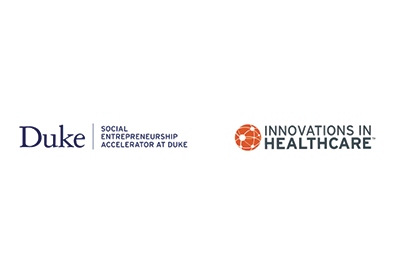 Do accelerator models really help innovations scale? And if so, what types of support are the most helpful in addressing growth challenges?
Do accelerator models really help innovations scale? And if so, what types of support are the most helpful in addressing growth challenges?
Innovations in Healthcare recently hosted a dinner to showcase and celebrate milestones achieved by innovators accelerated through the Social Entrepreneurship Accelerator at Duke (SEAD) program. The dinner, held in conjunction with the Sankalp Africa Summit 2019, highlighted the work and success of four East Africa SEAD innovator organizations. The event attracted investors, international consultancy firms, health policy stakeholders, and global health innovators.
SEAD was a five-year accelerator program (2013-2017) of Duke University, funded by USAID’s Global Development Lab. The learning accelerator brought together interdisciplinary partners across the university and leveraged institutional relationships and networks to create an integrated global health social entrepreneurship hub.
The program supported learnings and insights about innovation, accelerator support, and scaling that would feed back into the program design as well as support the field globally. One of the key early learnings was the importance of hands-on support with a local presence, leading Innovations in Healthcare to establish an East Africa regional office in Kenya. The level of support both to SEAD innovators and also the wider ecosystem provided by the East Africa office contributed to the scaling successes shared by innovators during the SEAD showcase event.
Josh Guenther, LifeNet’s Uganda Country Director, shared how SEAD’s capacity building support to innovators, customized to innovator needs, helped the organization increase its impact through rapid scale. Supported by SEAD, LifeNet has been able to expand from 10 partners in one country to 162 partners in four country programs. LifeNet, an organization that strengthens existing health systems, used the capacity building learnings to enrich their service offerings, including health worker training. Josh shared a story of how LifeNet training empowered a midwife based in one of their rural health centers to help babies struggling to breathe right after birth. She saved two babies the following month, using the new skills and confidence she gained in the LifeNet training program.
 Although access to capital is cited as one of the obstacles to scale, many organizations are not actually well prepared to receive funding. To address this, the SEAD program provided strategic support to increase innovators’ investment readiness while also engaging with investors exploring opportunities in the global health sector. Nicholas Sowden, co-founder of Penda Health, a chain of medical centers in Kenya, highlighted how this support prepared the organization to be investment-ready, attract impact funding and raise their series A round. This funding enabled their growth from one outpatient clinic in 2013 to 11 outpatient clinics across Nairobi in 2018, offering comprehensive affordable and quality care to Nairobi’s growing population.
Although access to capital is cited as one of the obstacles to scale, many organizations are not actually well prepared to receive funding. To address this, the SEAD program provided strategic support to increase innovators’ investment readiness while also engaging with investors exploring opportunities in the global health sector. Nicholas Sowden, co-founder of Penda Health, a chain of medical centers in Kenya, highlighted how this support prepared the organization to be investment-ready, attract impact funding and raise their series A round. This funding enabled their growth from one outpatient clinic in 2013 to 11 outpatient clinics across Nairobi in 2018, offering comprehensive affordable and quality care to Nairobi’s growing population.
A unique aspect of the SEAD program was the inclusion of academia, engaging students and faculty to bring new expertise and capacity. Eva Mwai, East Africa Regional Director for North Star Alliance, highlighted how MBA students and access to capacity building grants helped them critical improvements. North Star Alliance is an organization that leverages public private partnerships to provide healthcare services to mobile workers and the communities with which they interact with along Africa’s transport corridor. Through SEAD, Duke MBA students and Open Capital Advisors worked with North Star Alliance to develop financial sustainability strategies that included developing a business model and a quality improvement program to support scale.
 Afya Research Africa integrates health care provision, technology, and research to improve rural health care in Kenya. Sam Gwer, Executive Director, shared how the SEAD program helped Afya strengthen its business model and develop the Ubuntu Afya centers. The Ubuntu Afya centers are co-owned by local communities and Afya Research Africa, where the organization invests in table banking initiatives, enabling the members to save money for healthcare. In turn, the communities reinvest their profit into the health centers ensuring they remain operational.
Afya Research Africa integrates health care provision, technology, and research to improve rural health care in Kenya. Sam Gwer, Executive Director, shared how the SEAD program helped Afya strengthen its business model and develop the Ubuntu Afya centers. The Ubuntu Afya centers are co-owned by local communities and Afya Research Africa, where the organization invests in table banking initiatives, enabling the members to save money for healthcare. In turn, the communities reinvest their profit into the health centers ensuring they remain operational.
The SEAD program was instrumental in supporting the success of innovative healthcare organizations through customized capacity building, preparation for investment, funder engagement, and expertise from faculty and students. Perhaps most important, though, was the readiness of innovators to take on the program and translate the learnings into their organizations.
At Innovations in Healthcare, we continue to work with these impactful organizations as well as more than 90 others operating across 90 countries. We welcome the opportunity to collaborate with health stakeholders to share our learnings and design impact focused programs, evaluations, and tools to support global health innovators.

